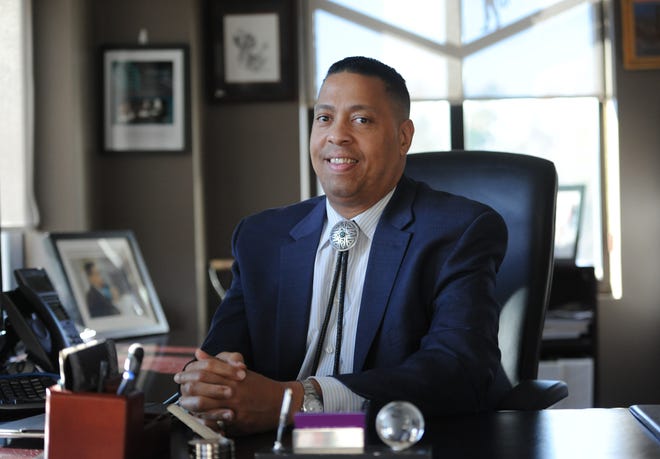Cromwell, DeQuattro plead not guilty to bribe, extortion, tax charges
BOSTON — Cedric Cromwell, former tribal council chairman of the Mashpee Wampanoag Tribe, and David DeQuattro, owner of a Rhode Island architectural firm that worked with the tribe, pleaded not guilty Thursday during their arraignment in U.S. District Court on charges of bribery and extortion, and, for Cromwell, filing false tax returns.
Cromwell, a 55-year-old Attleboro resident, was charged in March with four counts of filing a false tax return on top of other charges of bribery and extortion from November. He and DeQuattro were each indicted by a federal grand jury in November on two counts of accepting or paying bribes as an agent of an Indian tribal government, and one count of conspiring to commit bribery. Cromwell was also indicted then on four counts of extortion under color of official right and one count of conspiring to commit extortion.

They both had pleaded not guilty to the November charges, but were back in court Thursday after the "superseding indictment" was returned alleging the further tax-related charges against Cromwell.
The charges are in connection with the tribe’s plans to build a resort and casino in Taunton. DeQuattro’s company, Robinson Green Beretta Corp., was contracted to serve as the “owner’s representative” for the tribe for its casino project, and the indictment alleges that Cromwell used his role as chairman of the tribal council and his role on the tribe’s gaming authority to ensure that DeQuattro’s company would remain the representative for the project.
DeQuattro allegedly provided Cromwell with a stream of payments and benefits valued at about $57,549.37. In exchange, DeQuattro’s company was paid approximately $4,966,287.16 under the contract between July 2014 and February 2018, the indictment alleges.
Thursday's arraignment, conducted via Zoom teleconference, was on the superseding indictment for the tax charges. Cromwell on Thursday pleaded not guilty to all charges, including both the original bribery and extortion charges as well as the new tax charges. DeQuattro also pleaded not guilty on his charges from November.
The defendants argued during the hearing that Judge Marianne Bowler should grant a motion for what is called a “bill of particulars,” saying that the plaintiff’s indictments were vague about the allegations and requesting more specific details about what happened.
DeQuattro’s attorney, Martin Weinberg, wanted to know what exactly the government claims Cromwell communicated to DeQuattro as well as the times, places, manner and means by which the criminal conduct allegedly occurred.
“Despite the allegations, there (are) no specifics as to what Mr. Cromwell told Mr. DeQuattro,” Weinberg said in the hearing.
Prosecutor Christine Wichers countered that the 23-page indictment and the 31-page superseding indictment offer many details, including dates and payments. She said that she has produced all of the discovery on the underlying charges, although not yet on the recent tax charges, which will be submitted within two weeks.
Another hearing for Cromwell will be scheduled when the discovery evidence is presented on the tax charges.
The next status conference is scheduled for 3 p.m. May 18. In the interim, Bowler will send the case up to trial judge Douglas Woodlock to begin setting a date for the trial.
When the case does go to trial, Wichers plans to call 30 witnesses and estimates the trial will last two weeks.
On Thursday, Weinberg also filed a motion for the production of exculpatory evidence — or evidence that would free DeQuattro from blame — asking that the court review a limited subset of the discovery that includes the statements and testimony of Joseph Beretta, the former president of Robinson Green Beretta Corp.
Beretta is the government’s cornerstone witness in the case, Weinberg said during the meeting.
Weinberg said that when Cromwell asked DeQuattro for a donation on June 25, 2014, DeQuattro did not immediately write a check. He went to his company’s then president, Beretta, and they discussed the request for the donation. Beretta went to the company’s longtime attorneys and asked for legal advice, Weinberg said.
The attorneys provided opinions approving and/or not prohibiting or discouraging those donations, Weinberg wrote in the motion filed March 15. He argued that some of the attorneys told Beretta to proceed with caution and make sure the entity they were donating to was in good standing.
Beretta authorized each of the subsequent donations that DeQuattro made to Cromwell, Weinberg said. He authorized that in action and in words because he reimbursed DeQuattro, Weinberg said.
“This goes right to (DeQuattro's) good faith,” Weinberg said. “Did he give these donations as a corrupt bribe, or as a good faith campaign or political donation?”
Weinberg asked the court and the government to take Beretta’s statements and see that it shows DeQuattro was acting in good faith and could be "exculpatory" for DeQuattro.
Wichers said that Beretta’s statements do not include anything that would be exculpatory other than what she already disclosed in the discovery.
Bowler took the motion for a bill of particulars under advisement and denied the defendants’ motion for exculpatory evidence.
The defendants also filed motions Thursday for a speedy trial, describing the harm that could come by waiting longer. Weinberg was concerned the delay could be nearly a year because of additional discovery and motions related to the tax charges against Cromwell.
DeQuattro’s architecture firm has suffered a substantial loss of business as a result of the government’s allegations, Weinberg wrote in a motion. DeQuattro’s company had a contract canceled with Johnston, Rhode Island, schools for a project that was going to generate millions of dollars in fees, Weinberg wrote.
“Continued delay of these proceedings will only cause further damage, quite possibly irreversibly so, to Mr. DeQuattro’s business interests,” Weinberg wrote.



No comments:
Post a Comment